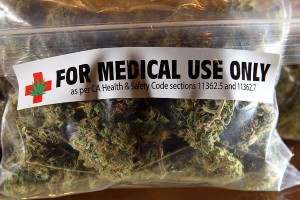
Could Pot Help Veterans With PTSD?
Marijuana and the Veterans Affairs Hospital system’s relationship is complicated. On the one hand, 23 states plus the District of Columbia say marijuana is legal for sanctioned medical use, and veterans are clamoring for it for their post-combat symptoms. On the other, marijuana is classified a Schedule I drug—the same as heroin. Under the aegis of the government, the VA system, and by extension the veterans who use it, has been stuck in the middle.
Experts say as many as 20 percent of veterans from Iraq and Afghanistan suffer from post-traumatic stress disorder. According to VA estimates in 2012, about 22 former members of the Armed Forces, on average, commit suicide every day. Antidepressants like Zoloft and Paxil, along with other heavy-duty pills, have been the traditional mainstays in VA doctors’ arsenals. Non-FDA approved options, marijuana among them, haven’t been options at all. But that has started to change. New Mexico has recently begun allowing VA Hospitals to prescribe medical marijuana for American soldiers’ PTSD. Maine became one of the first few states to follow suit.
In November 2014, Representatives Earl Blumenauer (D–Oregon) and Dana Rohrabacher (R–California) introduced the Veterans Equal Access Act, which aims to open the entire VA system to judicious prescription of medical cannabis. In May 2015, the Senate Appropriations Committee voted to back the amendment. Prior to its introduction, VA doctors couldn’t even discuss cannabis with their patients, much less prescribe it. Senator Steve Daines (R–Montana), who introduced the amendment, called forbidding such conversations unconstitutional. “They can’t discuss all the options available to them that they could discuss if they literally walked next door to a non-VA facility,” he told The Washington Post. “I don’t believe we should discriminate against veterans just because they are in the care of the VA.”
Nascent Research
In the past, marijuana studies have almost universally looked at harm, not efficacy, in treatment. Brain scientists are lending tentative support for the latter. “One way of thinking about PTSD is an overactivation of the fear system that can’t be inhibited, can’t be normally modulated,” Dr. Kerry Ressler of Emory University told NPR in 2013. In other words, the PTSD brain can’t get out of overdrive. Studies on mice in Germany beginning about a decade ago showed evidence that cannabis can help. Unfortunately, Ressler added, the fix may not be sustainable—prolonged exposure may make brain cells less sensitive to the chemicals in cannabis that are helping.
Practical research has begun its first toddling steps. The Washington Post reported last fall that researchers at New York University’s Langone Medical Center had begun developing cannabis-related medications for PTSD, according to the study’s supervisor Alexander Neumeister, targeted at unregulated receptors in the PTSD brain, which are activated when a person uses marijuana—a program its researchers say is still in far too early days to go mainstream, especially because possible deleterious side effects—such as potential short-term memory loss—haven’t been properly studied yet. Even studies that seem to praise cannabis’s power as a PTSD remedy emphasize caution alongside a call to arms. A study published in 2013 by George Greer in the Journal of Psychoactive Drugs reported a 75 percent reduction in CAPS (a clinician administered PTSD metric) scores when patients were using cannabis: “Conclusions: Cannabis is associated with reductions in PTSD symptoms in some patients, and prospective, placebo-controlled study is needed to determine efficacy of cannabis and its constituents in treating PTSD.”
Veterans, for their part, are finding it hard to wait for such studies to work out the cannabis-related kinks. If anecdotal evidence is to be trusted, many aren’t waiting at all.
PTSD Pot Pioneer
Enter Arizona psychiatrist Sue Sisley. At first blush, Sisley may not seem the obvious go-to advocate for cannabis as PTSD treatment. She’s never smoked marijuana herself, is a self-proclaimed “lifelong Republican” and has introduced anti-workplace-smoking legislation. But she’s also spent two decades treating patients with PTSD, and by her own admission, she doesn’t feel she can deny the boons presented to her patients. “Over the last decade, patients have slowly started telling me they were using marijuana successfully to manage their PTSD symptoms. I was extremely dubious at the beginning. I was thinking these guys are just drug seeking,” Sisley says. “I am trained in a very conservative medical field, where we only cover FDA-approved medicine. So for me to hear all these reports, it was discouraging, and I felt like a failure because they had to resort to this highly dangerous drug. Then slowly I stopped being so judgmental and started really listening to them.” Patients kept sharing their marijuana treatment success stories. Family members, too, told her “this plant” was giving them their spouse or father back. “All we have now is Zoloft and Paxil. And if you know much about those meds, you know there are many side effects, and they often don’t work. If they are effective, then patients are dealing with these side effects like weight gain and sexual disfunction,” Sisley adds. “Vets come home from service, and they just want to reintegrate into their family. And we make them fat and impotent and mired in a bunch of disabling side effects.”
After what she calls “a mountain of anecdotal evidence that was piling up over the last decade,” she partnered with a nonprofit in Santa Cruz, California, about five years ago that had been advocating for marijuana research for 20 years and began advocating for medical marijuana approval in Arizona. “One of the things I kept hearing from people was it would be negligent to use the medical marijuana law because there is not enough research,” she says. “I would keep telling them in the meantime people are suffering, and they need safe legal access.”
Read the full article over at Newseek.





Leave a Reply